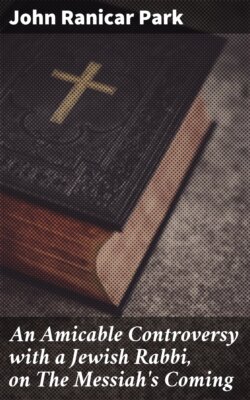Читать книгу An Amicable Controversy with a Jewish Rabbi, on The Messiah's Coming - John Ranicar Park - Страница 4
На сайте Литреса книга снята с продажи.
Preface.
ОглавлениеTable of Contents
What! another Commentary on Zechariah! the reader is ready to exclaim. Have we not a Lowth and a Blayney? What can learning, talent, or research effect, that has not been effected already? In a word, I answer—nothing. But, on the other hand, I ask, what have they effected? With the exception of particular passages, on which light has been thrown, the general scope of the prophecy remains as obscure as ever. Sufficient proof of this appears in the want of consistency in the plan of interpretation, which in one verse looks to future events, and in another to events long past, for explanation; in one part supposes the prophet [pg iv] to offer a connected series of consecutive predictions; in the next supposes him to be carried away by a transport into a digression bordering upon incoherency; varying, moreover, continually in the principle of exposition, which is literal or figurative, political or spiritual by turns. Surely this is not legitimate exposition, but rather bespeaks some latent error, some radical defect in the plan, or principle of investigation.
To point out that defect, which the writer fancies he has discovered, is the object of the present attempt; whether he be right or wrong, the reader must decide. The traveller who mistakes his road, only goes the farther astray the more he prolongs his journey. So the commentator on prophecy, who labours to force the text to a sense which it was not intended to bear, the more learning and ingenuity he employs, the more he becomes involved in intricacy and obscurity.
In expounding the prophecies relating to the Jews, commentators have had chiefly in [pg v] view their temporal and political state; whereas the writer conceives, that their moral and religious, that is, their spiritual condition, is really the main purport of those which relate to the restoration of Israel. Let any one read the description of the New Jerusalem in the 21st chapter of Revelations, and ask himself, if this can possibly apply to a literal city, or political state. It evidently cannot; and yet it must apply to some state of the Jews on earth; for the Messiah's kingdom is always described as a kingdom on earth; and, therefore, if the description does not apply to their temporal, it must to their spiritual condition.
The Messiah's kingdom is allowed to be the chief subject of these prophecies; but if Christ be the Messiah, his kingdom is a spiritual one, and what relates to it must be spiritually understood. We marvel at the blindness which prevents the Jews from perceiving in prophecy the numerous intimations of a spiritual Messiah, all of which appear to us [pg vi] to have been distinctly fulfilled in the person of Christ; and yet that very blindness to their spirituality is what prevents ourselves from understanding other prophecies relating to the same subject. Let this be steadily and uniformly kept in view, and most of the difficulties will vanish; and an interpretation will unfold itself, not only historically minute, and chronologically accurate, but which is, moreover, as far as scriptural language admits, literal; for in what relates to spiritual affairs, the spiritual is the most literal interpretation. This, then, is the principle of the following exposition, and when it has been found necessary to correct the translation, it was not for the purpose of finding out more recondite meanings, but to bring back the words of the text to their ordinary and literal signification.
With regard to the controversial form under which the treatise appears, a word of explanation may be requisite. The writer having framed his views of prophecy on principles [pg vii] most at variance with those of the Jews, and being only a self-taught Hebraist, was anxious to know how far his exposition might be controverted by an acknowledged Hebrew scholar of the Jewish persuasion. Upon inquiry he was referred to his present opponent, as the fittest person for that purpose; and he had the satisfaction to find, that however they might differ in the plan of interpretation, yet his opponent could rarely challenge the accuracy or fidelity of his translation; which he acknowledged to be more in accordance with the Christian principle of exposition, than any he had previously met with.
At the same time he declared the views it unfolded, to contain nothing likely to have any weight with a Jew; and readily pledged himself to answer those views, should the writer ever be disposed to publish them. The views and the answer are now before the reader.
[pg 001]
